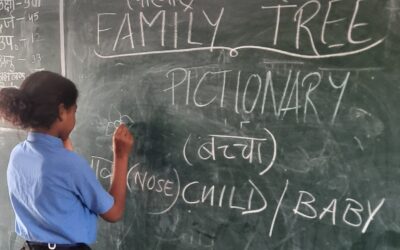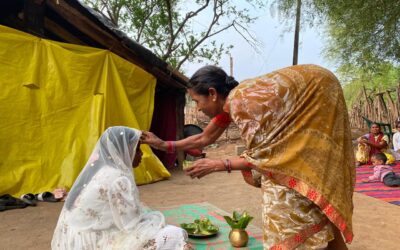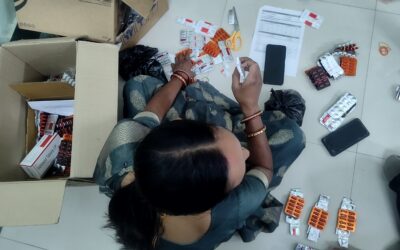A couple of months back, we had such an online session* on Empowerment by Sushma Iyengar, founder of Kutch Mahila Vikas Sangathan, Gujarat. I was excited about it, one because it was by such an inspiring leader and two, because of the topic. The term, empowerment, is vastly used in the context of social development. Even I have used it frequently but was never able to grasp the depth of it.
During the two hour interactive session, we talked about multiple facets of empowerment, and hence, power. We tried to understand who can be an oppressor, who is often the oppressed, what is the true meaning of empowerment, and how it is linked with liberation.
Sushma explained, “Empowerment is a change process. It means liberating oneself from their own trapping and making them the agent of their own process”. If I feel that I am empowered but I oppress someone else, then I’m not really empowered. The true purpose of one being empowered will be accomplished when I’ll empower others and will create a sense of freedom or liberation for them, not just for myself.
Empowerment is contextual. It is not specific to women, and is rather associated with all genders. Its meaning changes from community to community. Since the day I expanded my understanding of empowerment, I have been trying to identify empowered people around me…And I was able to find one.
Meenakshi tai is a cook in MANAVLOK. She is in charge of making three meals a day for the office staff. When I was first introduced to her by one of our team members, he had said “Ye hai humari Anndevi”. I had chuckled before us greeting each other with a smile. She showed me everything around and said, “Kuch chahiye ho didi to mujhe bas phone karna”. She is young and cheerful. Being more of an observer than a talker, I often found her running from dawn to dusk.
Meenakshi tai would wake up every day before 6 am, prepare meals for her kids, send them off to tuition, and then prepare breakfast followed by lunch and dinner for the office staff. In between, she would prepare separate meals for her children and herself. In the evening, she would go to pick up her daughter from the tuition classes, and on her way back, she would grab Vada Pav and ice cream for me. The last one has been a new addition to her routine.
For the first few days, we only exchanged smiles without talking much with each other, except she asking me, “Khana khaya theek se?” and “Kuch chahiye ho to batana”. But as time passed by, she became my favourite chai partner. We both would often sit in the kitchen and talk our hearts out.
I had a sense that she isn’t much older than me. But she has two teenage kids. One day, I casually asked why she decided to have kids so early. In response, she said, “Mera shadi to 13 saal meni hi ho gaya tha. Aur 16 tak do bachche bhi ho gaye”.
I was numb for a minute. Meenakshi tai went on and told me about the domestic violence she faced soon after she was married. For years, she was exploited, beaten with no food and water. Whether it was her husband, in-laws or her own family members, nobody spared her. The horrific and inhumane treatment she had gone through at such a young age is beyond my imagination even in my worst nightmare. My hands shiver as I type this.
What boggled me was the way she shared her story with me. There wasn’t any remorse or anger on her face. She narrated everything as a matter of fact. Like a doctor informing a family of one of their member’s death, without any emotions. Even if I try, I am unsure that I’ll be able to understand the pain she has gone through. Coming out of it is even more difficult to imagine. It takes years or a lifetime to overcome the trauma of physical abuse.
But there she is, sitting right in front of me, sipping tea and narrating her traumatic past years. The strength and the courage she has in her, has shaken me. From where does this immense strength comes? How is she not angry? It would be wrong of me to assume that she has overcome her past. Maybe she hasn’t. Maybe it is the circumstances that have forced her to close that door forever.
It again takes me back to what we learned in the empowerment session. Soon after that, Swati from our program team shared her insights on the topic, using a framework that describes it in four stages:
- Desire – To have the willingness to do something. The process of empowerment begins only when there’s a desire.
- Means – To find ways to do it. Trying and failing, yet exploring ways to fulfil the desire.
- Action (Behaviour of Self) – To make a choice after an informed analysis, and to act on the choice.
- Acceptance (Behaviour of Others) – To acknowledge the change and influence your surroundings. To transform from within and motivate others as well.
I could correlate this with Meenakshi Tai’s story. Her life had flipped 180 degrees with the news of her husband passing away, the sole breadwinner of the family. The abuse came to an end but at the cost of a bigger question, “Bina paiso ke ghar kaise chalega”. The wounds from the abuse were still fresh. However, she knew that she has to leave her past behind and search for a job.
Every day she walked miles from one village to another in need of paid work. After days of searching, she landed a job as a cook here in MANAVLOK. She had the burning desire to become financially independent and she did everything to do it.
Meenakshi tai is here for the past three years. I see her work hard every single day for her kids and herself. It is not easy to single-handedly cook back-to-back meals for everyone. It is not easy to look after the education and all other needs of two children. It is not easy to take care of growing old parents and parents-in-law. It is also not easy to be a mother, a daughter, a daughter-in-law, and an employee. It is not easy to be Meenakshi Tai!
She inspires me to the core, just by being a strong and courageous woman. A live example of empowerment. Residing in a place where child marriages are still prevalent, she motivates her daughter to move to another city and pursue her further studies. I already see a strong woman in her daughter.

Our lives are completely different. It wouldn’t be wrong to say that we don’t have anything in common. But still, we both saw a friend in each other. We often try to steal some time from our busy schedules to spend it together, sometimes by plucking tamarind from the trees, eating ice-creams from a thela, or moving our toes on famous Marathi songs. A bond of friendship binds us where we share our learnings, experiences, hardships, dreams, and aspirations.
“Ek baar mere bachche college mein settle ho jayein fir main apni padhai shuru karungi” says Meenakshi Tai. She also aspires to open an old age home once she has enough savings. Her dreams are never-ending and I have faith that with the strength, courage, and hard work she has, she will accomplish them.
Her struggles are not over yet. She is still fighting every day to be a good mother and a good daughter. Life has been unfair to her but she never complains. Instead, she keeps her chin up and faces every hurdle with a smile. She makes me want to be a better human being. To be a stronger version of myself. Now, before complaining about my problems, I always think about her. She has taught me to face everything in life with strength in my heart and a smile on my face.
*As a part of India Fellow, the fellows are engaged in constant learning during their entire journey, some of which is done through online sessions. These are conducted on diverse topics by mentors or experts from varied backgrounds.




0 Comments